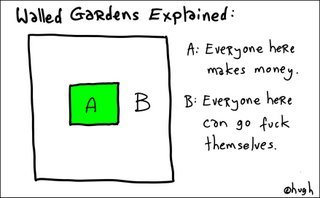Walled gardens redux
In a parallel post I described the landscape in which I consider that walled gardens, such as those still implemented by the incumbent consumer IM, are a flawed strategy.

In short, for any community based service, switching costs remain a critical success factor for building market share and defending against competition. However, as people themselves are increasingly becoming the sources of content and the owners of distribution, we are increasingly seeing an inversion of control, where service providers benefit from customers provided competitive advantages. For a service provider, basing a strategy on directly increasing switching costs by using walled garden becomes antagonist with the users' aspirations. Instead, as the control shifts towards community, a new environment appears where people themselves willingly create their own high switching costs.
When translating to real time communication technologies, it become evident that open protocols offering transparent and unbiquitous communications is the only acceptable way. As a consequence, only widely accepted and implemented open standards will remain. The same shift will apply to communication as it did to content generation and distribution. The end user themselves will want to create their own communication services, and will not accept anything but self imposed constraints. As a result of this new dynamic, they will only choose the easiest to implement and widest ranging protocols. In the end, the most successful services will be those who manage to hide the inherent complexity of any multimedia communication system, while providing unlimited interoperability.
Technorati Tags: Interoperability, Conversation space, AntecipateLabels: Instant messaging, XMPP





<< Home